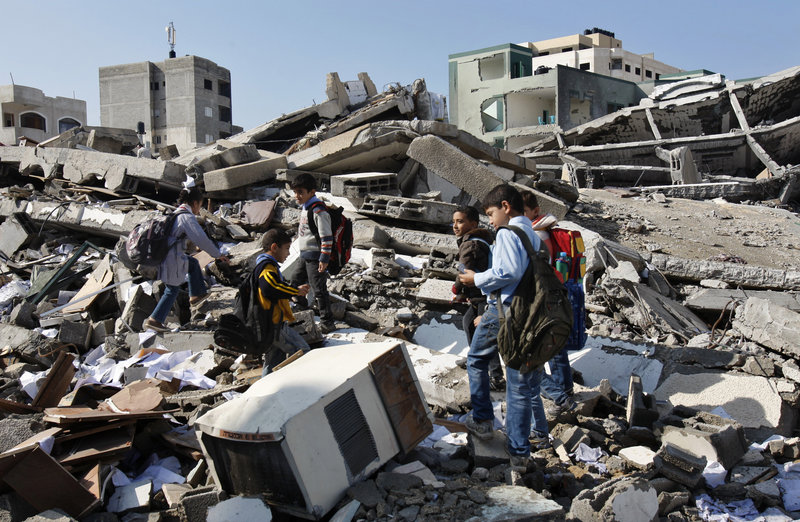JERUSALEM – Israel and Palestinian militants from the Gaza Strip began indirect talks Monday in Egypt aimed at forging a new era of relations between the bitter enemies following a cease-fire that ended the heaviest fighting in nearly four years.
The talks, being mediated by Egypt, were the first negotiations since the cease-fire took effect last Wednesday, halting eight days of airstrikes targeting militant groups in the Palestinian territory and rocket attacks that reached deep into Israel.
Israel launched some 1,500 airstrikes in a bid to end rocket attacks out of Gaza, while the Hamas and the Islamic Jihad militant groups fired a similar number of rockets at Israeli cities. More than 160 Palestinians, including dozens of civilians, were killed. Palestinian attacks killed six Israelis, including four civilians and two soldiers.
Now that fighting has subsided, Egypt is working with the sides on carrying out the second phase of the agreement: negotiating new border arrangements for the impoverished coastal strip.
The negotiations will not be simple. The militants want Israel to lift what remains of its blockade of Gaza, imposed five years ago after Hamas seized control of the territory from its Western-backed rival, Palestinian President Mahmoud Abbas. Israel has eased the blockade in recent years, but key restrictions remain in place on exports out of Gaza and the entry of badly needed building materials into the territory.
In return, Israel wants an end to arms smuggling into Gaza. Iranian-made weapons have made their way into Gaza through a circuitous route that ends with underground tunnels along the Egyptian border.
An Israeli official, speaking on condition of anonymity because he was not authorized to discuss the negotiations with the media, said Israel is prepared to take steps to help Gaza’s civilians, but would be wary of doing anything that could strengthen Hamas. In particular, he said the issue of arms smuggling would be high on the agenda.
“Our assessment is that successfully preventing the rearmament of Hamas and other groups is an integral element of maintaining long-term peace and quiet,” the official said.
Ghazi Hamad, a Hamas official in Gaza, said the group’s economics minister, Ziad al-Zaza, was leading the Palestinian delegation. He gave no further details, and it was unclear whether any timeline was imposed for implementing any deal.
In an interview Monday, Islamic Jihad leader Ramadan Shallah said Iranian President Mahmoud Ahmadinejad called him and Hamas’ prime minister, Ismail Haniyeh, to offer congratulations after their battle with Israel.
“Iran has been providing us with the support we needed to defend ourselves in the face of the Zionist occupation. Iran supported us militarily and financially and with everything we need to stand steadfast on our land,” Shallah said. “We appreciate that and hope that all the Arab countries do the same.”
Send questions/comments to the editors.



Success. Please wait for the page to reload. If the page does not reload within 5 seconds, please refresh the page.
Enter your email and password to access comments.
Hi, to comment on stories you must . This profile is in addition to your subscription and website login.
Already have a commenting profile? .
Invalid username/password.
Please check your email to confirm and complete your registration.
Only subscribers are eligible to post comments. Please subscribe or login first for digital access. Here’s why.
Use the form below to reset your password. When you've submitted your account email, we will send an email with a reset code.